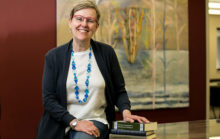Donna Orwin is the Chair of the Department of Slavic Languages and Literature and a professor of Russian literature associated with the Munk School of Global Affairs. A specialist of writer Leo Tolstoy, she shares with us her thoughts on literature, travel, and the importance of learning more about what makes a culture or language truly unique.
Describe your big “a-ha” moment.
There were two moments for me. The first one was during my sophomore year as an undergraduate at Cornell University. I was reading Tolstoy’s early diaries, which he wrote when he was himself at university. I realized that the issues he was struggling with were very much my own, and I became fascinated by how these issues could bring us together, despite time and distance, and how much I could learn from him. The second moment came later, when I was finishing my dissertation at Harvard. I was 28 years old, and I had received a grant to spend eight months in Russia – it was very difficult to go there back then. I had mostly learned from reading books, and this experience of living abroad was eye-opening for me because I was testing my knowledge on the ground.
What’s a global issue that you’re passionate about and why?
I’m drawn to the particularities of cultures and languages that are different from our own, and I believe it is essential to study these differences. As a young American girl from Maine, I just assumed the whole world was like me. When I got into Russian language and literature, I realized that there were many things about the world that I didn’t know or understand, and it made me want to learn more about these things so that I could learn more about myself. It’s one of the reasons I wanted to become a professor – to spread the word and encourage people to embark on a similar journey.
What impact do you want to make on the world or your local community?
I believe literature can take you into other times and places. What makes a book truly great is the fact it can be interpreted in many ways, generation after generation – people will take different things from it and apply them to their understanding of the present. My task is to connect people with the great writers. I try to facilitate this through teaching and writing, in an academic context but also for the general public, so that everyone gets a sense of what an essential contribution the humanities can make, within as well as outside the university.
What does the future hold for you?
I will be on leave this year, and I will be dedicating myself to the preparation of a two-volume anthology on war and Russian culture commissioned by Columbia University Press. It’s truly an honour for me; it’s something I’ve always been interested in ever since I began studying war through Tolstoy. We can’t understand Russian behaviour simply by comparing it to our Canadian experience – it is rooted in difference, and obviously influenced by the complexity of its own history, language and culture. I hope my contribution will illuminate these particularities and help us better understand Russia today and the times we live in.
What is your personal philosophy?
Don’t do anything that you would be ashamed of – do things that matter to you and make you proud when you go to sleep at night.
May 15, 2017
